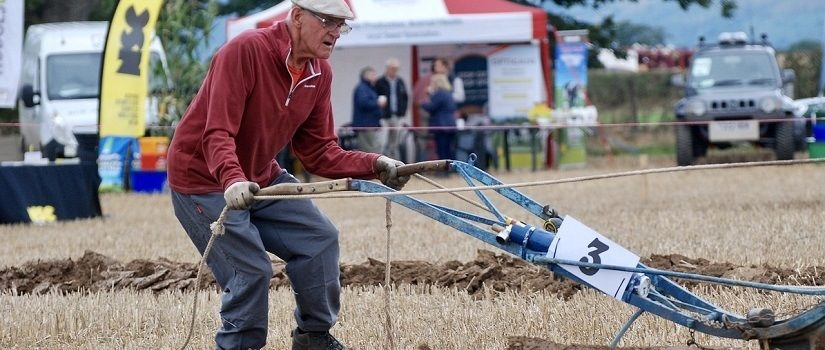Ploughmen, Don’t Look Back
By James L. Thornton
~~~~~~~~~contents~~~~~~~~
A. Introduction
B. The ploughmen
C. The fallow ground
D. Jesus Is Calling For Ploughmen
E. The Field
F. Men’s Hearts Are Hard
G. Don’t Look Back
~~~~~~~~~~~~~~~~~~~~~~~~~~~~~~
A. Introduction:
Jesus was an intense observer of human nature and everywhere he went he observed people at their work or occupation. We can see the results of these observations in his parables and daily teaching as he spoke about their many problems and difficulties, as well as the successes of these occupations.
In the 13th chapter of Matthew alone he speaks about the farmer, the woman in her kitchen, the merchant, the fisherman and the householder.
In this lesson, we have chosen a scripture in which Jesus uses one of these occupations to teach a lesson on laboring in the gospel.
Luke 9:62. And Jesus said unto him, no man, having put his hand to the plough, and looking back, is fit for the kingdom of God.
Jeremiah 4:3. For thus saith the lord to the men of Judah and Jerusalem, break up your fallow ground, and sow not among thorns.
Hosea 10:12. Sow to yourselves in righteousness, reap in mercy; break up your fallow ground: for [it is] time to seek the lord, till he come and rain righteousness upon you.
THE PLOUGH:
Egypt claims the invention of the plow. It was very crude until the last 100 years. The early plows were made of wood even until the last century or two. They were fashioned with only one handle, and were pulled by oxen (1 Kings 19:21), these are still used use in some areas of the world.
B. THE PLOUGHMAN:
Let us picture the ploughman with one hand on the handle, with his face firm, and his back bent. In the other hand was an ox goad with which he prodded and guided the two oxen that pulled the plow.
In Old Testament days it was never considered degrading work. Wealthy men put their hand to the plough, no doubt Elisha was a wealthy man, and even kings have been known to plough.
Ploughing is the heaviest work in the toil of the field. Sowing is relatively easy labor, even the children were used to sow the seed. Reaping is a joyful time. The Bible says, “We shall come rejoicing bringing in the sheaves.” (Psalms 126:6)
Ploughing is heavy, laborious work. It takes a man to plough. I can remember my dad, when I was a child, out in the field ploughing, with him and the mules straining every muscle. He called it disturbing the soil, turning the sod, breaking the hard surface. He was exposing the hidden earth to the rains and the air.
Ploughing is strenuous labor, but necessary labor. So is ploughing in the Kingdom of God, it overturns traditions, pulverizes hard customs, breaks up popular ideas. The world is still very unfavorable to spiritual religion.
The Bible emphasizes the fact that conditions of the soil, as well as the conditions of men’s hearts must be changed before the seed is sown. Men do not sow the seed until the ground is broken up by the plough, turning over the earth along with the weeds and thistles.
The same with the Gospel seed, men’s hearts have to be changed to be receptive to the word of God. This is where the ploughmen do the job, preaching and praying and testifying to a lost world.
C. THE FALLOW GROUND:
The fallow ground in the above scriptures refers to land that has fallen out of cultivation, or that has never been cultivated. And this has its counterpart in the broad fields of humanity, in the nations or individual men, who are not under the influence of spiritual cultivation.
Fallow ground is comparatively useless, even though it may not be utterly fruitless. Good thoughts and good deeds sometimes spring up in heathen nations and irreligious people. But such fruit is poor compared with fruit of people who are under cultivation by the Gospel of Jesus Christ.
The highest thought, the purest morality, the noblest effort, the largest charity, are only to be found where spiritual life is cultivated by worship, instruction, and discipline.
Fallow ground bears weeds and thorns. It is not utterly bear ground, it is a wilderness. The same with a neglected soul, it will not be merely devoid of good; it will bear a crop of evil. If the heart is not filled with pure thoughts, it will indulge in unholy imaginations; if it has no worthy love of Godly things, its affections will descend and entwine about some debased object; if it is not active in doing good, it will be diligent in doing harm. And the more fertile the soil the more abundant the crop of weeds.
Fallow ground can be broken up and cultivated. There is hope for the most neglected person, the worst sinner, the oldest enemy of Christ. The Gospel of Jesus Christ will break up the hardest heart if presented in the proper manner.
Fallow ground must be broken up by the plough. Throw bushels of wheat among the thorns, and the thorns will only “choke” it (Matthew 13:7), until the old evil is torn from the heart, the new truth cannot grow and bear fruit there.
Men must repent of sins before they can receive the seed of eternal life to grow and produce fruit.
The mere hearing of the truth is not enough. If the heart is hard, it will not receive it (Isaiah 4:9-10). If the heart is preoccupied, the truth will soon be forgotten, or at best be crushed out of all living energy. Therefore the heart must not only be cleared of weeds, it must be softened. The plough must break up the fallow ground.
It is our duty to break up the fallow ground. We are sometime to eager to sow the seed. Consequently the slight returns we have for so much effort and expenditures. People are called to accept Christ who do not know Christ, and would have no room in their hearts to receive him if they did know him.
Much so-called “Gospel Preaching” thus meets with ridicule, or indifference. If we were less hasty in seeking great results we would see more, true, fruitful returns for our work.
We note the complacency of so many Americans, the tendency to be more interested in Church-going and less concerned with the theological aspects of religion than their forbearers. Note the drive towards a shallow and implicitly compulsory common creed (everyone believing the same thing).
We could call it a religion-in-general, superficial, a ministry of reconciliation, destructive of the profounder elements of faith. A religion of celebration, instead of “true worship.”
These are the very conditions Jeremiah was dealing with in our reading when he told them to, “Break up your fallow ground.” The object of the ploughing is clear. The soil that has been left untilled, that has been hardened and packed solid by being repeatedly trodden upon, this ground must be broken up and turned; it must be prepared for the reviving and fructifying rain of the Lord’s grace.
The calloused heart and hardened heart will have to feel the discipline of the plough. Tradition and pride must be overturned.
Jesus was not always, and only, calling, “come unto me!” or, “follow me!” less pleasing, and in some eyes less important, were the words, “repent!” words that were seen by him as necessary.
Men need instructing as well as inviting, rebuking as well as exhorting.
Amos was a ploughman,
Jeremiah was a ploughman.
John the Baptist was a ploughman, calling for deep repentance, and telling the people that they could not enter the Kingdom of God on the strength of their heritage. (Matthew 3:7-9)
Jesus was a ploughman and he demanded repentance from everyone (Luke 13:3).
Peter was a ploughman, he also called for repentance for those Jews who were responsible for the crucifixion of Jesus (Acts 2:38).
Paul was a ploughman, demanding repentance (Acts 26:20).
As the earth resists the plough, so does the world resist the Gospel. The ploughshare means change from the ordinary. Plough-work is heavy work, pioneer work, lonely work, exacting work.
Luke 9:62. And Jesus said unto him, no man, having put his hand to the plough, and looking back, is fit for the kingdom of God.
This is not said about the sower or the laborers in the vineyard.
In the above scripture, Jesus is relating that the man’s heart was not yet thoroughly engaged in Christ’s service. Those who look back, like Lot’s wife, want to go back. Jesus will not share his throne with any one, not even our relatives.
D. JESUS IS CALLING FOR PLOUGHMEN:
Jesus is calling men into his service, men of masculine hand-grip, men with fixed and unshakable opinions, with firm commitments to holiness, devoted to God, church, and family.
He is asking for tough, tenacious ploughmen, capable of sustaining great tension or strain without breaking or letting go. Jesus called it, “looking back.” Men and women who will do the hardest work, preaching the Gospel of Jesus Christ in the face of all the opposition in the world. Preaching against the evils of the world and standing for the truth of God’s Word.
E. The Field Is The World:
Jesus told his disciple to, Go ye into all the world and preach the gospel to every creature.” (Mark 16:15)
The fallow ground has a lot of rocks, stumps, and much hard soil. But there is nothing like the smell of new turned earth. There is no greater joy in one’s life than to win a soul to Christ.
Singing is not plough-work, it is glamour work. The music, the testifying is done after the ploughman has done his job. Singing on Sunday morning is easy work after the plough-work is done and after the hard hearts has been broken up by the plough, and the Spirit of God comes to soften the soil to receive the seed of the word of God.
Listen to the Apostle Peter as he ploughs on the day of Pentecost. (Acts 2)
To Paul at Thessalonica, and Athens (Acts 17). At Ephesus (Acts 19), what a field! What a ploughman!
What would the world be like, what would our nation be like, what would our own life be like, if it were not for the ploughmen?
Men who came and told us the truth about ourselves, and what we should do to be saved.
Men who have ploughed and changed the world, men who have hazarded their lives to change conditions of men’s heart. (think of some ploughmen in your life)
F. Men’s Hearts Are Hard:
Men’s hearts are the hardest known substance.
Jeremiah 17: 9. The heart is deceitful above all things, and desperately wicked: who can know it?
10. I the Lord search the heart, I try the reins, even to give every man according to his ways, and according to the fruit of his doings.
From a Missionary in China. After 30 years service.
“Up at daybreak—made potage and tea, a few huts in sight,
In the shape of converts I have no results. I have not, as far
As I am aware, seen anyone who even wanted to be a Christian.
Oh, if things would only move!”
G. DON’T LOOK BACK:
Even if you see no sign of results, keep your hand on the handle of the plough, guide it to end of the furrow.
Preachers, Bible teachers, Evangelists, Sunday-School workers, look straight ahead, don’t turn to right, or to the left, keep ploughing until Jesus comes or calls for you. Wavering is one of the greatest perils, and may soon be fatal.
He who wavers, vacillates, and turns to look round to things that are left, lose the direction; and direction, once lost, who knows how much else may be lost before it can be recovered?
Write To Us, [email protected]
Visit Our Web, www.Godsgrazingfield.net
By James L. Thornton
^^^^^^^^^^^^^^^^^^^^^^^^^^^^^^^^^^^









